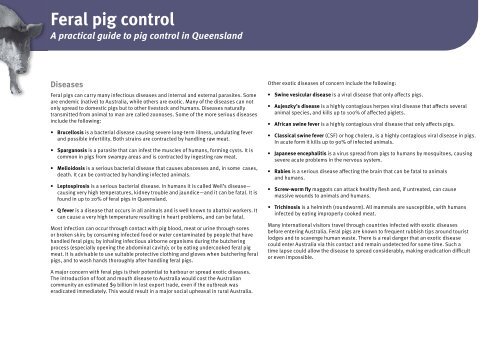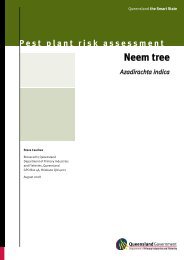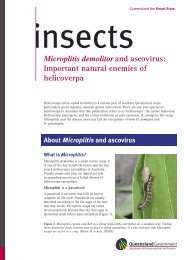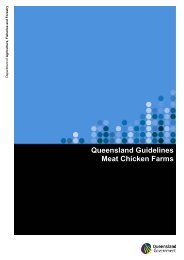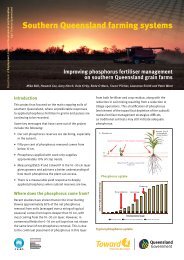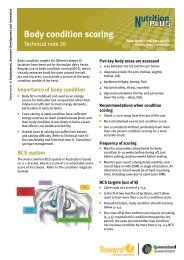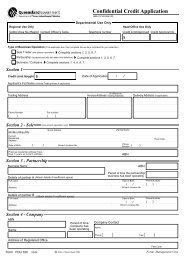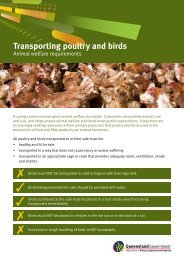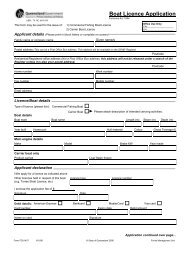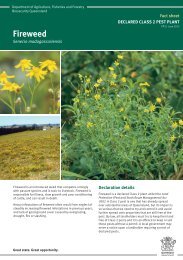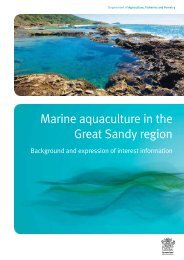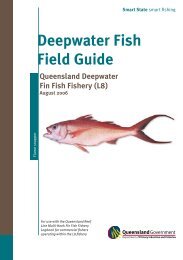Ipa Feral Pig Control Manual - Department of Primary Industries ...
Ipa Feral Pig Control Manual - Department of Primary Industries ...
Ipa Feral Pig Control Manual - Department of Primary Industries ...
Create successful ePaper yourself
Turn your PDF publications into a flip-book with our unique Google optimized e-Paper software.
<strong>Feral</strong> pig control<br />
A practical guide to pig control in Queensland<br />
Diseases<br />
<strong>Feral</strong> pigs can carry many infectious diseases and internal and external parasites. Some<br />
are endemic (native) to Australia, while others are exotic. Many <strong>of</strong> the diseases can not<br />
only spread to domestic pigs but to other livestock and humans. Diseases naturally<br />
transmitted from animal to man are called zoonoses. Some <strong>of</strong> the more serious diseases<br />
include the following:<br />
• Brucellosis is a bacterial disease causing severe long-term illness, undulating fever<br />
and possible infertility. Both strains are contracted by handling raw meat.<br />
• Sparganosis is a parasite that can infest the muscles <strong>of</strong> humans, forming cysts. It is<br />
common in pigs from swampy areas and is contracted by ingesting raw meat.<br />
• Melioidosis is a serious bacterial disease that causes abscesses and, in some cases,<br />
death. It can be contracted by handling infected animals.<br />
• Leptospirosis is a serious bacterial disease. In humans it is called Weil’s disease—<br />
causing very high temperatures, kidney trouble and jaundice—and it can be fatal. It is<br />
found in up to 20% <strong>of</strong> feral pigs in Queensland.<br />
• Q fever is a disease that occurs in all animals and is well known to abattoir workers. It<br />
can cause a very high temperature resulting in heart problems, and can be fatal.<br />
Most infection can occur through contact with pig blood, meat or urine through sores<br />
or broken skin; by consuming infected food or water contaminated by people that have<br />
handled feral pigs; by inhaling infectious airborne organisms during the butchering<br />
process (especially opening the abdominal cavity); or by eating undercooked feral pig<br />
meat. It is advisable to use suitable protective clothing and gloves when butchering feral<br />
pigs, and to wash hands thoroughly after handling feral pigs.<br />
Other exotic diseases <strong>of</strong> concern include the following:<br />
• Swine vesicular disease is a viral disease that only affects pigs.<br />
• Aujeszky’s disease is a highly contagious herpes viral disease that affects several<br />
animal species, and kills up to 100% <strong>of</strong> affected piglets.<br />
• African swine fever is a highly contagious viral disease that only affects pigs.<br />
• Classical swine fever (CSF) or hog cholera, is a highly contagious viral disease in pigs.<br />
In acute form it kills up to 90% <strong>of</strong> infected animals.<br />
• Japanese encephalitis is a virus spread from pigs to humans by mosquitoes, causing<br />
severe acute problems in the nervous system.<br />
• Rabies is a serious disease affecting the brain that can be fatal to animals<br />
and humans.<br />
• Screw-worm fly maggots can attack healthy flesh and, if untreated, can cause<br />
massive wounds to animals and humans.<br />
• Trichinosis is a helminth (roundworm). All mammals are susceptible, with humans<br />
infected by eating improperly cooked meat.<br />
Many international visitors travel through countries infected with exotic diseases<br />
before entering Australia. <strong>Feral</strong> pigs are known to frequent rubbish tips around tourist<br />
lodges and to scavenge human waste. There is a real danger that an exotic disease<br />
could enter Australia via this contact and remain undetected for some time. Such a<br />
time lapse could allow the disease to spread considerably, making eradication difficult<br />
or even impossible.<br />
A major concern with feral pigs is their potential to harbour or spread exotic diseases.<br />
The introduction <strong>of</strong> foot and mouth disease to Australia would cost the Australian<br />
community an estimated $9 billion in lost export trade, even if the outbreak was<br />
eradicated immediately. This would result in a major social upheaval in rural Australia.


